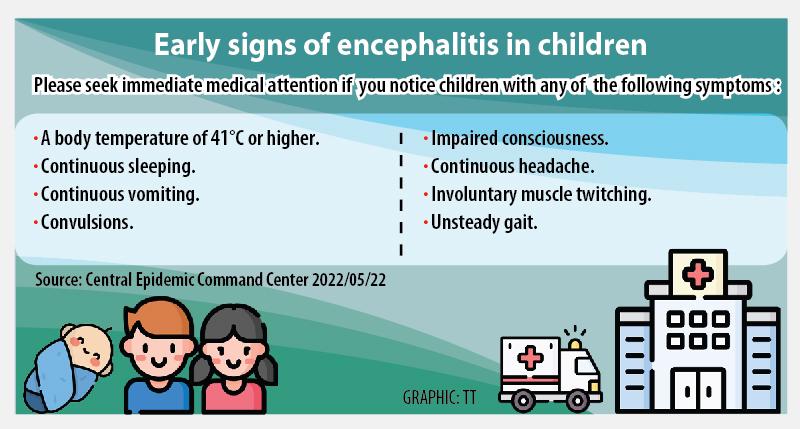Several children in Taiwan have developed acute encephalitis after contracting COVID-19, which could be caused by an excessive immune response, an immature blood-brain barrier, genes or environmental factors, doctors said.
Of the 22 children aged one to 12 with severe COVID-19, 11 have developed acute encephalitis, or inflammation of the brain, the Central Epidemic Command Center (CECC) said yesterday.
Ten children aged one to 12 have died of COVID-19 since April 19, five of whom had developed acute encephalitis, the center said.

Pediatric Infectious Diseases Society of Taiwan president Chiu Nan-chang (邱南昌) said the main factor that contributes to acute encephalitis in such cases is the sudden release of cytokines in large amounts, which damage the nervous system and is known as a “cytokine storm.”
Cytokines, a type of protein, are part of the body’s immune system and respond to pathogens.
However, if the pathogen triggers an excessive immune response, it can lead to a cytokine storm that can damage the body, including the nervous system, said Chiu, who is also a pediatric infection physician at Mackay Memorial Hospital.
In addition to a cytokine storm, other paths by which SARS-CoV-2 can enter the central nervous system and cause acute encephalitis were also observed in those cases, Chiu told the CECC’s news briefing on Saturday.
This can make it difficult to take measures to prevent complications that could cause a sudden onset of severe symptoms, he said.
Lee Chien-chang (李建璋), a physician at the National Taiwan University Hospital’s (NTUH) Department of Emergency Medicine, said the coronavirus could penetrate the system in the brain that shields against substances, including pathogens, in the blood, known as the blood-brain barrier.
In children infected with COVID-19, the virus could directly cross the barrier, because the structure is still immature, Chinese-language news site The Reporter quoted him as saying on Friday.
However, the reason the cases developed acute encephalitis would remain unknown without a pathological anatomy of the infection, he added.
SARS-CoV-2 can move from the nerves to the brain stem, resulting in acute encephalitis, NTUH pediatric infectious disease physician Lee Ping-ing (李秉穎) said in a radio interview on Thursday.
The current situation is similar to the enterovirus 71 epidemic in Taiwan in 1998, during which brain stem inflammation caused by the virus proved fatal for many children, Lee said.
As brain stem inflammation progressed quickly and caused excessive fluid buildup in the lungs or acute heart failure, the children died one to two days after infection, he said.
In the 1998 outbreak, about 120,000 children were confirmed to have enterovirus 71, of whom 405 were severe cases and 78 died, translating into a fatality rate of about 6 per 10,000 cases, the CECC said.
As of Thursday, the COVID-19 mortality rate for children up to nine was about 0.3 per 10,000 cases, it said.
It advised parents to have their children vaccinated against COVID-19 as soon as possible.
A similar trend also exists in Hong Kong, the center said.
The condition might be more prevalent among ethnic Chinese, although it could also be related to metabolic or environmental factors, said Centers for Disease Control Deputy Director-General Philip Lo (羅一鈞), deputy head of the CECC’s medical response division, on Wednesday.
Lee Chien-chang echoed the view, saying the different theories for the pathogenesis of brain inflammation linked to COVID-19 infection fail to explain the trend, because it was not seen in Western countries.

The Central Weather Administration (CWA) today issued a "tsunami watch" alert after a magnitude 8.7 earthquake struck off the Kamchatka Peninsula in northeastern Russia earlier in the morning. The quake struck off the east coast of the Kamchatka Peninsula at 7:25am (Taiwan time) at a depth of about 19km, the CWA said, citing figures from the Pacific Tsunami Warning Center. The CWA's Seismological Center said preliminary assessments indicate that a tsunami could reach Taiwan's coastal areas by 1:18pm today. The CWA urged residents along the coast to stay alert and take necessary precautions as waves as high as 1m could hit the southeastern

The National Museum of Taiwan Literature is next month to hold an exhibition in Osaka, Japan, showcasing the rich and unique history of Taiwanese folklore and literature. The exhibition, which is to run from Aug. 10 to Aug. 20 at the city’s Central Public Hall, is part of the “We Taiwan” at Expo 2025 series, highlighting Taiwan’s cultural ties with the international community, National Museum of Taiwan Literature director Chen Ying-fang (陳瑩芳) said. Folklore and literature, among Taiwan’s richest cultural heritages, naturally deserve a central place in the global dialogue, Chen said. Taiwan’s folklore would be immediately apparent at the entrance of the

Speeding and badly maintained roads were the main causes of a school bus accident on a rainy day in Taipei last year that severely injured two people and left 22 with minor injuries, the Taiwan Transportation and Safety Board said. On March 11 last year, a Kang Chiao International School bus overturned inside the Wenshan Tunnel (文山隧道) on the northbound lane of the Xinyi Expressway. The tour bus, owned by Long Lai Co, exceeded the speed limit after entering the tunnel, the board’s investigation found. Sensing that the rear of the vehicle was swaying, the driver attempted to use the service and exhaust

“China is preparing to invade Taiwan,” Deputy Minister of Foreign Affairs Francois Wu (吳志中) said in an exclusive interview with British media channel Sky News for a special report titled, “Is Taiwan ready for a Chinese invasion?” the Ministry of Foreign Affairs said today in a statement. The 25-minute-long special report by Helen Ann-Smith released yesterday saw Sky News travel to Penghu, Taoyuan and Taipei to discuss the possibility of a Chinese invasion and how Taiwan is preparing for an attack. The film observed emergency response drills, interviewed baseball fans at the Taipei Dome on their views of US President